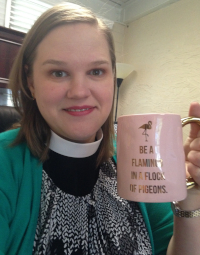Proper 16
Eleventh Sunday after Pentecost
Sunday, August 25, 2019
Year C
Luke 13:10-17 and Psalm 103:1-8
“Bless the Lord, O my soul, and all that is within me, bless His holy name! … He has done great things, bless his holy Name!” (“Bless His Holy Name” by Andraé Crouch)
“Bless the Lord, O my soul, O my soul, worship His holy name, sing like never before, O my soul, I’ll worship Your holy name!” (“10,000 Reasons” by Matt Redman)
“O bless the Lord, my soul! His grace to thee proclaim! And all that is within me join to bless His holy name!” (“O Bless the Lord, My Soul” by James Montgomery, Hymnal 1982, #411)
So many songs we know and love have been inspired by David’s hymn Psalm 103. It’s a hymn of praise and one that comes from the very depth and entirety of David’s soul. When I read Luke 13:10-17, I can almost hear these same words of praise coming from the mouth and soul of the woman who had been crippled by a spirit and hunched over for 18 years.
After such a long time hunched over, only looking to the ground, “when [Jesus] laid his hands on her, immediately she stood up straight and began praising God.” The phrase “began praising” is in the imperfect tense, meaning that this wasn’t just a one and done “Thank You, Lord.” This means that the woman continues praising God for all He has done. She has been set free from a spirit, and she has been changed, not just physically, but spiritually. Other Bible versions say she “glorified God.” This is also the same word Luke uses to describe what happens to the centurion, who after witnessing Jesus’s death “glorified God” and proclaims that “surely this was a righteous man” (NKJV).
This woman experiences the mercy, grace and love of Jesus and now sees with different eyes. But in complete contrast to the woman’s eyes being opened, the synagogue ruler’s eyes remain closed. He is blind to the mercy and love of Jesus, even though he has just witnessed it! Instead, he calls Jesus out, attacking Him and trying to stir up trouble for Jesus because He has healed on the Sabbath. Surely the ruler knows that acts of mercy are permitted on the Sabbath as Jesus then reminds him, asking if his ox and donkey are more worthy of mercy than this woman.
Like this synagogue ruler, many times our eyes are closed to the things around us; we don’t want to see the things that are hard to see so we ignore them. Not out of malice, but out of fear, because we know that if we see them, we will be called to do something about them. But as children of God that is exactly what we are called to do, whether we avert our eyes or not. We are called to go and do, to see others as Jesus sees them and to share the same mercy, grace and love that we receive as sons and daughters of Christ with those we meet, with all those we meet.
 And it’s those times when we step into that fear, when we trust God and step out of our comfort zones to do what God is calling us to do, that we are set free and we can stand up straight, look into the face of God fully and praise Him.
And it’s those times when we step into that fear, when we trust God and step out of our comfort zones to do what God is calling us to do, that we are set free and we can stand up straight, look into the face of God fully and praise Him.
“Bless the Lord , my soul; all my inmost being, praise his holy name. Praise the Lord, my soul, and forget not all his benefits—who forgives all your sins and heals all your diseases, who redeems your life from the pit and crowns you with love and compassion, who satisfies your desires with good things so that your youth is renewed like the eagle’s” (Ps. 103:1-8, NIV).
Reverend Becky Toalster is the rector of Holy Trinity Episcopal Church in Bartow.

